
Ukraine war: Russia hits blood transfusion centre, says Zelensky
People have been reportedly killed and wounded in the strike in north-eastern Ukraine, says the president.
2023-08-06 05:56
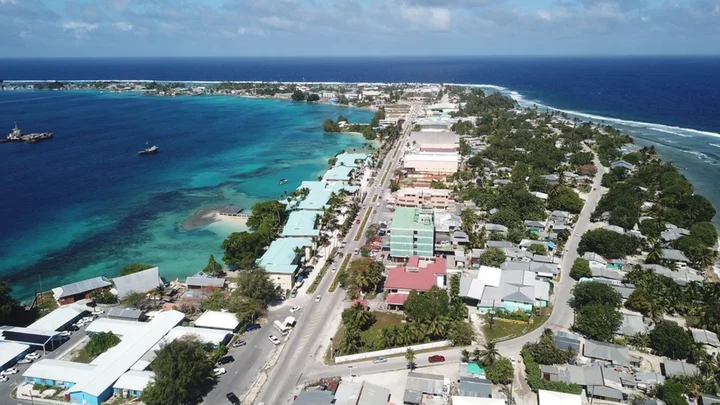
Marshall Islands media guide
An overview of the media in the Marshall Islands, including links to broadcasters and newspapers.
2023-07-12 16:46

Samoa media guide
An overview of the media in Samoa, including links to broadcasters and newspapers.
2023-07-11 20:58

7 Republican AGs write to Target, say Pride month campaigns could violate their state's child protection laws
Republican attorneys general from seven states signed a letter Wednesday to Target, warning clothes and merchandise sold as part of the retail giant's Pride month campaigns could violate their state's child protection laws.
2023-07-08 23:59

Irish government announces RTÉ examination
Minister Catherine Martin announces an independent, root and branch examination of broadcaster RTÉ.
2023-07-04 22:46
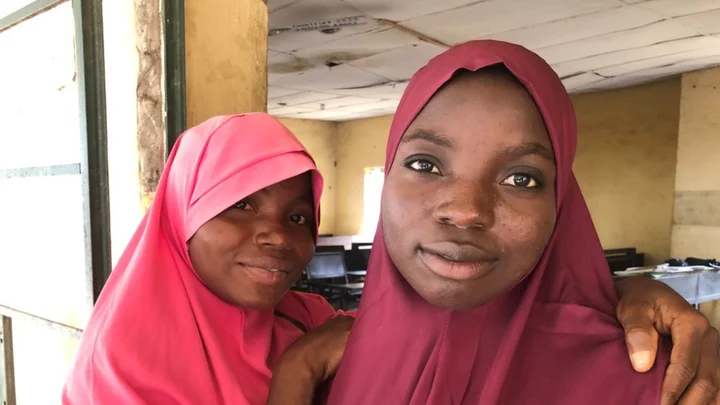
Nigeria offers students loans - they want jobs
Two massive reforms are aimed at improving Nigeria's dilapidated universities - but will they work?
2023-07-03 08:28
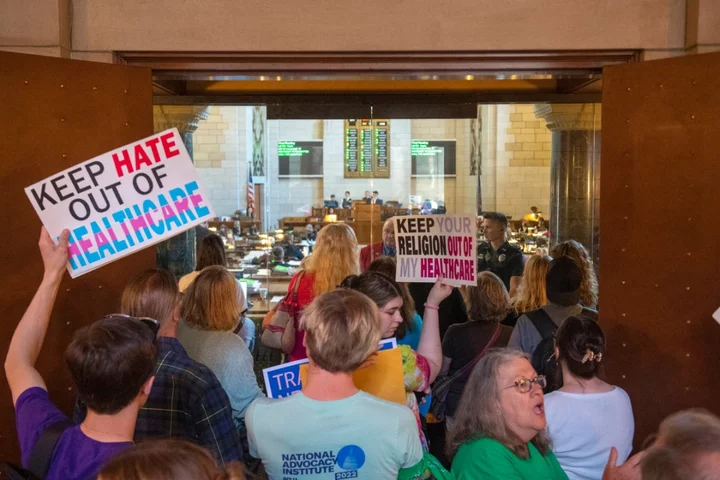
Meet the pioneering transgender inmates who fought for gender-affirming surgery in US prisons
More than a dozen states have enacted policies banning gender-affirming healthcare for transgender people, as Republicans nationwide have made limiting the rights of LGBTQ+ people a central part of their platform. However, in US prisons, hardly known for vigorously protecting civil liberties, an unlikely revolution is underway, moving things ever so slowly in the opposite direction. Thanks to a group of pioneering inmates, in the last seven months, the federal prison system provided the first and second ever recorded cases of gender-affirming surgery for its prisoners. The procedures were a culmination of decades of activism, perseverance, and lawsuits from transgender people in the carcercal system, who fought for legal recognition and dignity at the same time they were fighting for survival, with trans people behind bars facing staggering amounts of violence and sexual abuse. Nonetheless, despite these milestones, incarcerated people and legal experts say the prison system still barely recognises the basic humanity of trans people, and puts up numerous hurdles to them getting the medical which they need – and which they are entitled to under the US Constitution. There are an estimated 1,200 transgender people in the US prisons, less than one per cent of the total population behind bars. They may be a small population, but trans people face a disproportionate share of the violence and abuse that plagues the American prison system at large. Being trans in prison “exponentially increases the risk of being sexually abused and physically abused,” Julie Abbate, national advocacy director at Just Detention International, a human rights organisation which seeks to end sexual abuse in prisons, told The Independent. More than one third of trans people in prisons and jails experience sexual violence, the highest reported level of any group, according to a 2018 report by the Bureau of Justice Statistics. Many struggle to access basic services from prisons, like being housed in the wing matching their gender or getting hormone treatments. Donna Langan, who is housed at a federal prison in Texas, was one of those who fought against this onslaught of mistreatment. Langan, 65, has been serving a life sentence without parole since 1996, after robbing two banks and assaulting federal officials while being part of a neo-Nazi group. According to Langan, the violent persona was a mask for someone who was struggling for decades with their gender identity, and she has since disavowed her hateful views. She once wrote her “entire life has been shaped by the agonizing tension between the immutability of her gender identity and the often life-or-death danger of publicly living her truth.” Not long after entering the system, Langan began reckoning more directly with her gender, and started seeking hormone treatments, but it would take until 2012 to get hormone replacement therapy and take another four years to get moved to a women’s facility. In that long interval, she faced harassment from fellow inmates, and continued to plead with prison authorities for gender-confirming surgery. “I had to constantly think every day about different survival strategies,” she told The Intercept in 2018. “You’re like, ‘I’m not trying to be a victim,’ yet if you’re too aggressive in defending yourself, you can get in trouble.” On paper, the process shouldn’t have been that complicated. Prisons are required to provide inmates with necessary medical care, and under the standards of care from organisations like the World Professional Association for Transgender Health (WPATH) and the American Medical Association, gender-affirming surgery is a key tool in fighting the medical condition of gender dysphoria. Joe Biden had campaigned on a promise to “ensure all transgender inmates in federal correctional facilities have access to appropriate doctors and medical care.” And the federal Bureau of Prisons (BOP) even has a dedicated group, the Transgender Executive Council, which meets to work through issues and requests related to trans inmates. Nonetheless, repeated requests from Langan went denied or simply unanswered. Finally, in 2020, she sued in federal court, claiming prison officials were violating her constitutional rights of equal protection under the law and breaking the 8th Amendment, which prevents cruel and unusual punishment. Langan continued to experience “debilitating anguish as a result of severe and inadequately treated gender dysphoria” her complaint against the BOP in 2021 read. With a lawsuit looming, the agency’s years of delay vanished, and Langan was fast-tracked for surgery, receiving the procedure at the end of 2022. “I hope that many others who need gender confirmation can get it too,” Langan said in a statement after getting the surgery. Her story – suffering in prison, seemingly arbitrary delays, a lawsuit forcing action – is hardly unique. Cristina Nichole Iglesias has been in since 1994, almost always housed in men’s facilities even though she is a transgender woman. The Florida inmate has been subject to vicious sexual and physical abuse as a result. In 2016, she first began seeking gender-affirming surgery, after enduring years of mistreatment. “There were pretty regular thoughts about self-harm and self-castration. It was just almost debilitating for her,” Li Nowlin-Sohl of the American Civil Liberties Union, which worked with Iglesias to challenge her treatment, told The Independent. “It’s extremely dysphoric to be in that situation. It’s also very unsafe to be a woman, a transgender woman in her case, in her case someone who is on hormones and has breasts, to be in a male facility. There have been times when she’s been forced to bathe within view of either male guards or male inmates. She’s received threats.” By 2019, the BOP still hadn’t budged on Iglesias’s surgery requests, with the agency claiming she needed to have been housed in a women’s ward for a year before getting the treatment, even though petitioning for such transfers is nearly impossible in the federal prison system for all but a tiny group of inmates. That same year, she filed a lawsuit. Another three years later, and the government eventually approved her request for surgery in summer of 2022, though it still took months for the surgery to be complete. “They just kind of kept not making a decision, even after the court ordered them to make a decision,” Ms Nowlin-Sohl added. “To us, it was potentially an intentional bureaucratic slowing down of the process.” Finally, in March of 2023, Iglesias got her surgery, and the BOP agreed in a settlement to set out timelines for gender-affirming treatments, and to commit to regarding permanent hair removal and gender-affirming care as medically necessary, even though medical officials have held this view for years. “I feel so relieved,” Iglesias said in a statement after the surgery. “I fought for so long to get the healthcare I need, but wasn’t sure this day would ever come. Now, the federal government has finally agreed to provide me with gender-affirming surgery. This will change my life and allow me to live as the woman I am. Gender-affirming care is necessary, lifesaving, and— for me and so many others — long overdue.” The victory was deep, but it may only be temporary. This year, as part of a suite of extreme restrictions on LGBTQ+ and in particular trans people, Florida governor Ron DeSantis passed a law that would forbid public funds from going to any hospital, city, or county, which provides gender-affirming care, potentially imperiling the ability of other Florida inmates like Iglesias to get the kind of care they are legally guaranteed. The advances at the federal level followed activism from people in state justice systems. In 2020, after fighting the Idaho prison system for years Adree Edmo became the second incarcerated person in the country to ever receive gender-affirming care, following a 2017 case in California prison. Despite a 2012 diagnosis by prison doctors of gender dysphoria, it took a multi-year legal battle, including taking her case to the Supreme Court, before Edmo’s surgery was approved. Amy Whelan, senior staff attorney at the National Center for Lesbian Rights, helped litigate Edmo’s case. “Some of [the prison system’s] arguments were that this is a controversial aspect of medicine, which it is not. The medical community has known for decades how to treat gender dysphoria. It’s very well established that those treatments are safe and effective and part of the standard of care,” she said. “They also argued prisoners in particular do not get to choose the specific form of medical care that they can receive and that because Idaho had provided Ms Edmo with hormones and with other treatments like access to mental health care, that surgery was not required for her,” she added. “That was very contrary to the evidence in the case and the expert testimony…The other treatments were so inadequate that she attempted self surgery in order to treat herself.” The herculean, multi-year battles in court to achieve these surgeries are at odds with the basic facts of the law: courts, including the US Supreme Court, have long held that it’s a violation of the 8th Amendment ban on cruel and unusual punishment for prisons to deny prisoners vital medical care. “The one thing that government officials can’t ignore is the constitution,” Beth Littrell, senior supervising attorney with the Southern Poverty Law Center’s prograame on LGBTQ+ rights, told The Independent. Still, prisons have considerable discretion and power in interpreting what medically necessary care means. “The prison officials will say, in our opinion, this person’s gender dysphoria is adequately treated, and then you’ve got to get in front of a court and prove they’re wrong and prove why this sort of treatment is inadequate. It’s having the burden of proof in every case which of course for incarcerated people is no easy task,” she added. “On top of that, the thing we’re seeing is wholly unqualified healthcare providers who don’t know anything about gender dysphoria, have never treated it before, or in fact are transphobic, and they’re the people who decide whether or not a trans person who is incarcerated needs gender confirming surgery.” Even to those who advocate on behalf of trans people in court, the rationale of when the BOP’s Transgender Executive Council provides certain care and when it doesn’t can be hard to parse. “It’s not totally clear to people what their process is,” Ms Whelan of the National Center for Lesbian Rights said. “The BOP has this subcommittee that is made up of people, who they don’t really disclose publicly, who considers issues related to transgender prisoners. They have private meetings about those people. It’s not clear what standards they’re providing.” And what standards do make it from behind the curtain seem to fly in the face of basic medical ethics at times, including requirements that trans prisoners avoid disciplinary infractions before accessing certain kinds of care. “They don’t condition any other kind of medical care on disciplinary records,” she added. “That part of their policy is just blatantly unconstitutional. They would never say in any other context, for instance, well I’m going to withhold insulin from this person or I’m not going to fix their broken arm because they have this disciplinary history.” Even accessing less intensive treatments like hormones can be difficult, compounding the other structural disadvantages that put trans people in a vulnerable position well before they arrive in prison. Ashley Diamond was born in 1978 to a strict Southern Baptist family in Rome, Georgia. She told her family at a young age she was a woman, and was kicked out of the house by the time she was a teenager, though she managed to find a doctor who prescribed hormone treatments and recommended living in her true gender. In 2012, she was incarcerated after unknowingly pawning a stolen saw for her boyfriend, the beginning of a hellish journey through the Georgia prison system, out to freedom, then back again. When she arrived in prison, Ms Diamond said she felt like a “deer in the headlights,” about to be housed in a men’s prison after decades of living as a woman. “Back then, I was literally told, the state of Georgia literally told me, they’re going to make a man out of me. That was literally what I was told when I got there,” she told The Independent. “I’m wearing Hannah Montana pajamas, I have long hair, with breasts, and I’m in a men’s prison.” Once inside the maximum security Valdosta State Prison, she asked a guard if there was a safe place for people like her. He asked if she could make a fist and fight. “Get ready,” he said, “you’re going to do a bunch of that.”* Not only was Ms Diamond housed with men, and sexually assaulted multiple times in prison, but she also lost access to her hormones, causing devastating and lifelong health impacts. “I was vomiting all the time. My breasts started shrinking up. My hips started shrinking up. My hair was not growing,” she said. “Like I was dying right in front of my eyes. I felt like a wilting flower.” Eventually, even though she says she thought victory had a “snowball’s chance of surviving in hell,” she sued the state of Georgia, arguing their “freeze frame” policy, requiring proof of previous accces to hormones, was violating the 8th Amendment. The Justice Department filed a statement of interest in the case, and in 2016, she settled with Georgia, which put her out on parole and dropped its hormone policy. That wasn’t the end. Back in Rome, she was suddenly a celebrity, with people thinking she became rich from her settlement. Members of her family still shunned her. The Ku Klux Klan burnt a cross on her lawn. “I became very very depressed,” she said. “I needed help and I needed help from people who understood what I was going through.” In 2019, she was arrested for failing to appear at a court hearing and violating the terms of her parole because she crossed state lines to access a gender-affirming medical care centre in Florida. Suddenly, she was back where she started, held in a men’s facility, and besieged with violence once again, all while delays in prescriptions meant she functionally still didn’t have access to her hormones. She filed a second lawsuit challenging her conditions in 2020, and in 2022, upon receiving parole, decided to drop the case. Now, she she’s in Rome once again, exhausted, but planning to “get the hell out of Georgia” and move to Los Angeles, where she hopes to pursue her interest in singing and finish making a record. She already works as a Whitney Houston impersonator and wants to move on from the “psychological damage” her battle with the state of Georgia caused. Family members recently ransacked her house. “I’m still not where I need to be,” she told The Independent. “I’m resilient. I’ll be ok.” However, to move she still needs permission from the state of Georgia, the same institution that twice nearly killed her by putting her in men’s prisons. Otherwise, moving away, and moving on with her life, could constitute another parole violation. All of these people are descendants, in a legal sense, from Dee Farmer, a transgender inmate in Indiana who was the first trans person to bring a case to the US Supreme Court. She alleged prison officials knowingly put her in danger, after she was sexually assaulted during her time in a men’s prison ward. The high court agreed, finding that prison officials could be shown to be negligent for not protecting trans people. The decision has been cited numerous times and helped inspire the landmark 2003 Prison Rape Elimination Act. Her story illustrates both how much has changed, and how little has advanced, when it comes to the life of transgender people inside of prisons. Like many transgender people now, Ms Farmer struggled as a young person with harsh bullying from her peers and living on her own. She dropped out of high school and soon racked up of a series of credit card-related infractions, which occurred when she was a teenager and young woman and didn’t really understand what she was doing, other than using shopping as an “escape.” On the outside, she couldn’t get access to medical treatment. “I was already taking female hormones on the black market. I was getting them from some of the people I was hanging out with, some of them were trying to transition,” she told The Independent. In the system, officials lashed out at every turn. In court during her 1986 conviction, a judge demanded she stop dressing as a woman. After she was found guilty, a prison official made inappropriate remarks when she arrived in prison, saying, “If I was locked up, you would be my wife.” She was housed with men and cut off from her hormones. “I never really even had considered that they would place me in a woman’s facility because you know back then it was never even heard of,” she said. “The term transgender wasn’t even heard of. I didn’t learn about gender dysphoria and all that stuff until I went to prison. The people out in the community that I lived in, even though there were many trans people in that community, they really didn’t know about their conditions and their rights and stuff.” After being raped, she was put in segregation, a form of solitary confinement, with prison officials saying it was for her protection. To this day, many trans people, forced to endure the risks of living in a prison of the opposite gender, are housed in solitary in this manner, even though many human rights experts consider such solitude a kind of torture. From behind her bars, Ms Farmer watched as her fellow brutalised LGBTQ+ inmates arrived in protective custody. “I just felt so horrible for them,” she said. “It was almost like we’ve all endured this.” Some people, faced with choosing life in segregation or violence in the general population, chose the latter after a few weeks of near-total isolation. One of the only places Ms Farmer was allowed to go was the law library, where she read all day and helped her fellow inmates file legal challenges. She only got hormone treatment towards the end of her time in prison, many years and numerous lawsuits later. Ms Farmer, who is now a speaker and legal consultant, is amazed that people in US prisons are now getting gender-affirming surgeries. “It’s amazing to me,” she said. “Since I’ve been released, I’ve had my own gender-affirming surgery. I tell people that I never envisioned the day that this would almost become the norm, that it would be acceptable and respected and it’s just really a good feeling. It just inspires me to want to do more and more and to open up as many doors as I can.” It is both vexing, and a potential glimmer of hope, that the treatments transgender people are seeking are legally protected and medically backed. That means, according to Julie Abbate of Just Detention, the main thing that needs to change in US prisons is not any particular policy, but rather the much fuzzier target of the culture within prisons at large. “People can do the right thing under most existing policies,” she said. “I think the change has to really be on a more basic level, on the level of dignity and respect and understanding. These changes are free. They cost no money.” And yet, as the stories of Donna Langan, Cristina Nichole Iglesias, Adree Edmo, Ashley Diamond, and Dee Farmer make clear, the fight for these basic tenants of human understanding can be the toughest battle of all in America. Read More She lost her transgender son to suicide. She isn’t giving up fighting for him ‘It’s hard on our family’: For these lawmakers with trans children, Republican attacks are personal Parents of transgender youth are suing to block Georgia's gender-affirming care ban
2023-07-01 06:59

10 Facts About James Baldwin’s ‘Giovanni’s Room’
James Baldwin's novel 'Giovanni’s Room' was rejected by editors and publishers before it was eventually released in 1956.
2023-06-26 20:23
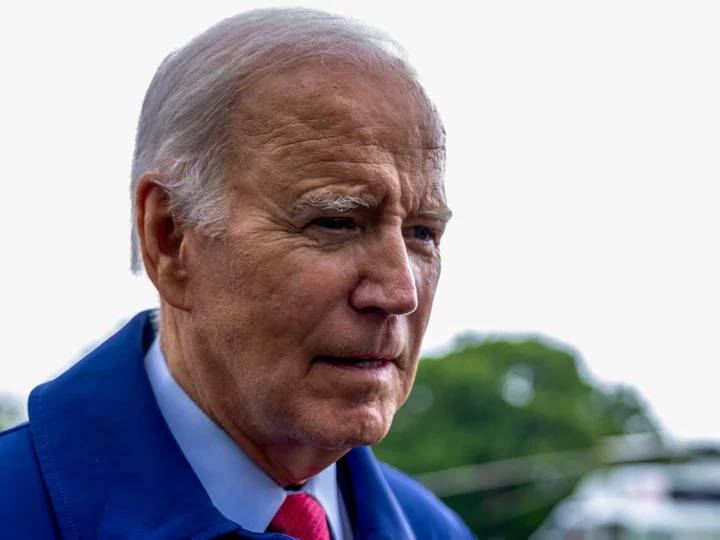
Biden’s troubled journey on LGBT+ rights is a ‘beautiful thing’, top US diplomat says
President Joe Biden’s journey on LGBT+ rights, from supporting restrictions to becoming the first top Democrat to come out in support of gay marriage, has been praised by a top US diplomat as a “very American story” and a “beautiful thing”. Mr Biden joined the chorus of outrage after the passing of Uganda’s draconian anti-gay law, calling for its immediate repeal and threatening sanctions if no action is taken. “The enactment of Uganda’s Anti-Homosexuality Act is a tragic violation of universal human rights—one that is not worthy of the Ugandan people, and one that jeopardizes the prospects of critical economic growth for the entire country,” he said in a statement on Monday. “I join with people around the world — including many in Uganda — in calling for its immediate repeal. No one should have to live in constant fear for their life or being subjected to violence and discrimination. It is wrong.” The bill was signed into law on Monday by Ugandan President Yoweri Museveni. The law includes the death penalty for what’s referred to as “aggravated homosexuality” – meaning those having sex while being HIV positive, those having sex with minors or others considered to be vulnerable. Under the law, an individual found guilty of “attempted aggravated homosexuality” can be sent to prison for 14 years. Mr Museveni sent the law back to the national assembly in April, requesting amendments to clarify the difference between identifying as LGBT+ and taking part in homosexual acts. That prompted pushback from some legislators, who appeared concerned that Mr Museveni would veto the bill as he faced a pressure campaign to do so from abroad. The amended version of the bill was passed early last month. Under a law from the colonial era, homosexuality was already illegal in the East African country as being “against the order of nature”, and with a possible punishment of life behind bars. Mr Biden said that since the new law was introduced, “reports of violence and discrimination targeting Ugandans who are or are perceived to be LGBTQI+ are on the rise. Innocent Ugandans now fear going to hospitals, clinics, or other establishments to receive life-saving medical care lest they be targeted by hateful reprisals”. “Some have been evicted from their homes or fired from their jobs. And the prospect of graver threats — including lengthy prison sentences, violence, abuse — threatens any number of Ugandans who want nothing more than to live their lives in safety and freedom,” he added. “This shameful Act is the latest development in an alarming trend of human rights abuses and corruption in Uganda. The dangers posed by this democratic backsliding are a threat to everyone residing in Uganda, including US government personnel, the staff of our implementing partners, tourists, members of the business community, and others.” Mr Biden said he has asked the National Security Council to review what effect the new law will have on the US relationship with Uganda, including the ability of the US to “safely deliver services under the US President’s Emergency Plan for AIDS Relief (PEPFAR) and other forms of assistance and investments”. The president said his administration is looking at possible sanctions and restricting entry into the US for anyone “involved in serious human rights abuses or corruption”. Mr Biden noted in his statement that “In total, the US government invests nearly $1bn annually in Uganda’s people, business, institutions, and military to advance our common agenda”. As vice president, Mr Biden forced the hand of the Obama administration when he went off-message during a May 2012 TV interview, becoming the highest-ranking Democrat to publicly support gay marriage. Mr Biden’s evolution on gay rights was a long time in the making. As a senator, he voted for the Defense of Marriage Act in 1996, which blocked the federal recognition of same-sex marriages. Earlier in the 1990s, he voted to remove federal funding for schools that taught acceptance of homosexuality. In 1973, he was captured wondering aloud if gay people may be security risks while serving in government or military roles. In an interview with The Independent, the State Department’s Chief of Protocol Rufus Gifford said that the president’s journey on gay rights is a “very American story”. “I think about my own evolution on equality, I think about my parents’ evolution on equality. And it’s a beautiful thing,” the 48-year-old said. The former US ambassador to Denmark describes his current role as “the first handshake and the American welcome for leaders” from around the globe. Mr Gifford advises the president and vice president on diplomatic protocol - and he travels with Mr Biden on all official international trips. Mr Gifford added that the president “opened his heart and mind to new ideas. And isn’t that all we want from our leaders?” “I mean, sure, let’s debate the evolution to a certain extent. But let’s lean into the fact that this evolution is real, it’s meaningful, and it’s actually impacting our lives,” he said. Read More Rachel Levine on Congress bigots, Don’t Say Gay and life as Biden’s top trans official: ‘Despair doesn’t motivate change’ Thousands march in Jerusalem Pride parade, first under Israel's most right-wing government ever LGBT+ flags vandalised for a fourth time at Canada church on eve of Pride Month Pregnant transgender man stars on Glamour UK’s Pride cover in hand-painted suit ‘A second job covered in glitter’: Meet the LGBT+ drag nuns who beat the LA Dodgers
2023-06-02 01:20
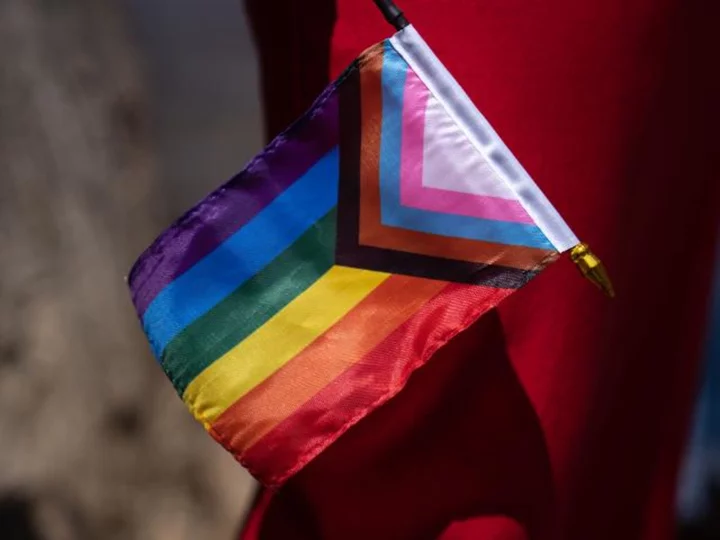
Pride Month was once an easy win for brands. Now, the stakes are much higher
Companies have long embraced Pride Month in June as an uncomplicated way to market to members of the LGBTQ+ community while telegraphing progressive values. But this year won't be nearly so straightforward.
2023-06-01 18:47
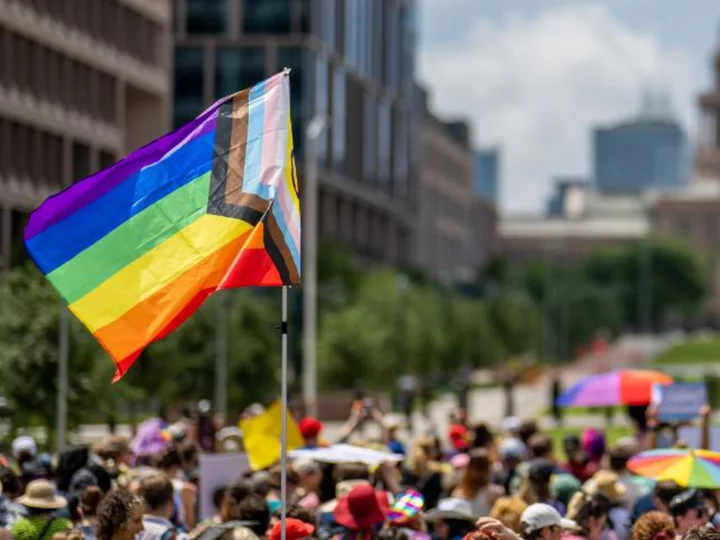
Right-wing media figures are waging an anti-LGBTQ war on businesses over Pride Month
Prepare yourself for a Pride Month imbued with callous intolerance.
2023-06-01 10:48

Ukraine war: Wagner chief vows to hand Bakhmut to Russian army by June
The chief of the mercenary group made the claim but Ukraine says it still controls parts of the city.
2023-05-22 18:51
